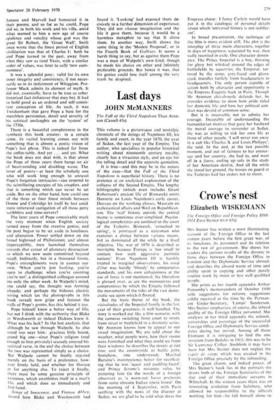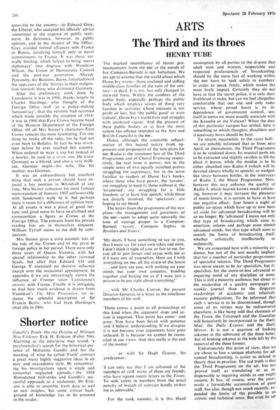Crowe's nest
Elizabeth WISKEMANN
The Foreign Office and Foreign Policy 1898- 1914 Zara Steiner (cup 65s) Mrs Steiner has written a most illuminating account of the Foreign Office in the last sixteen years before the first great war, of its functions, its personnel and its relation to the rest of government. She shows her readers the curious results of the divorce in those days between the Foreign Office in London and the Diplomatic Service abroad, and describes the absurd waste of time and ability spent in copying and other purely routine work by more or less well qualified people.
She prints as her fourth appendix Arthur Ponsonby's memorandum of October 1900 with suggestions for reform, suggestions coldly received at the time by the Perman- ent Under-Secretary, 'Lamps' Sanderson. Mrs Steiner emphasises, of course, the inbred quality of the Foreign Office personnel. She analyses in her third appendix the schools, universities and parentage of the successful Foreign Office and Diplomatic Service candi- dates during her period. Among all those Etonians it is intriguing to find the one invasion from Bedales in 1913; this was to be Sir Lawrence Collier. Snobbish it may have been but Mrs Steiner does not neglect the esprit de corps which was created in the Foreign Office precisely by the inbreeding.
The great charm, and indeed power, of Mrs Steiner's book lies in the portraits she draws both of the Foreign Secretaries of the day and of their immediate servants in Whitehall. In the sixteen years there was an interesting evolution from Salisbury, who allowed no responsibility to the officials working for him—he felt himself alone re- sponsible to the country—to Edward Grey, the Liberal, who accepted his officials' advice sometimes at the expense of public senti- ment. In deference, however, to public opinion, and to the despair of 'the Office', Grey avoided formal alliances with France or Russia, involving himself only in naval commitments to France. It was these, not really binding, which helped to bring 'secret diplomacy' into disgrace with Woodrow Wilson, the Union of Democratic Control and the post-war generation. Already Ponsonby, the Buxtons, Burns, foreshadowed the appeasers of the 'thirties in their indigna- tion towards those who distrusted Germany.
After the preliminary work done by Lansdowne it was in 1906, thanks largely to Charles Hardinge, who thought of the Foreign Office staff 'as a policy-making bureaucracy', that the reforms had occurred which made possible the situation of 1914; it was in 1906 that Eyre Crowe became head of the Western Department of the Foreign Office. Of all Mrs Steiner's characters Eyre Crowe rernains the most fascinating. For one thing he broke all the rules, for he had not even been to Bedales. In fact he was seven- teen before he ever reached this country. When ordered to wear a top hat instead of a bowler, he took to a straw one. He knew Germany as a liberal, and also a very brilli- ant. German might—his wife, like his mother, was German.
It was an extraordinary but excellent thing that such a person should have en- joyed a key position in Whitehall at any time. Mrs Steiner compares his most famous memorandum of January 1907 unfavourably with Sanderson's reply to it, but perhaps there is room for a difference of opinion here. At all events it was a piece of good for- tune and good sense to have so civilised and cosmopolitan a figure as Crowe at the Foreign Office. The extracts from his private reading lists are in themselves eloquent. William Tyrrell seems to me dull by com- parison.
Mrs Steiner gives a crisp account, too, of the role of the Crown and of the press in foreign policy in her period. There were only three years of Queen Victoria, with her special relationship to the other crowned heads, but after that Edward VII and George V exercised no decisive influence except over the occasional appointment. In appendix 6 we are interestingly shown the influence of Cromer upon Lansdowne's entente with France. Finally it is intriguing to find how much evidence is drawn from Vansittart's The Mist Procession. for in- stance the splendid description of Sir Francis Bertie. who had been Hardinge's chief ally in 1906.



































 Previous page
Previous page